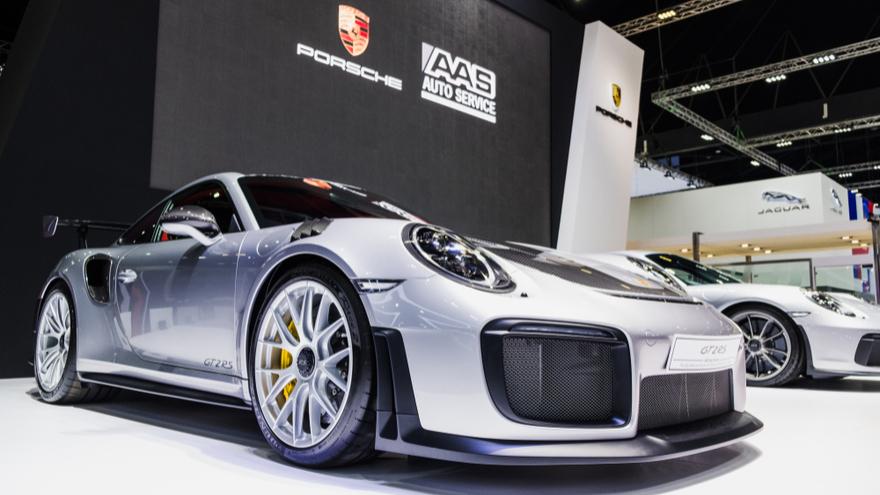Appeal of new vehicles improves again (especially Porsche, Ram, and Ford)

Porsche was the brand with the highest APEAL score. Pictured is a 2018 Porsche 911 GT2 RS. Photo credit: OATTY OATTY / Shutterstock.com.
By subscribing, you agree to receive communications from Auto Remarketing and our partners in accordance with our Privacy Policy. We may share your information with select partners and sponsors who may contact you about their products and services. You may unsubscribe at any time.
COSTA MESA, Calif. –
All automakers are manufacturing vehicles that consumers like, said J.D. Power vice president of global automotive Dave Sargent.
“But some of them are doing it at a higher level than others,” Sargent said in a news release.
Porsche, Ram, and Ford are among the automakers doing the best job of reaching those high levels, according to the J.D. Power 2019 Automotive Performance, Execution and Layout, or APEAL, study released on Wednesday. The study shows that for the fifth consecutive year, appeal of new vehicles has improved.
According to the study, infotainment improvements and a greater availability of advanced driver assistance systems are among the factors that are causing increasing satisfaction for consumers regarding their new vehicles.
This year, the industry average satisfaction index score moved up to 823 (out of a possible 1,000) compared to 820 in 2018. Also, 22 of the 32 brands included in the study showed improvement over last year.
The brand with the highest overall APEAL score of 891: Porsche.
Subscribe to Auto Remarketing to stay informed and stay ahead.
By subscribing, you agree to receive communications from Auto Remarketing and our partners in accordance with our Privacy Policy. We may share your information with select partners and sponsors who may contact you about their products and services. You may unsubscribe at any time.
BMW and Genesis tied for second in that overall category with 868. Audi was next at 867, followed by Volvo at 863.
In the mass market segment, Ram ranked highest with a score of 851. Coming in next were Dodge (848), MINI (835), Volkswagen (829) and Ford (828).
Ram won the category of most-improved brand, with a 26-point increase over 2018. Other strong showings in that category were Dodge (+24); Jaguar (+16); Land Rover (+15); Audi (+14); and Jeep (+14).
Ford Motor Co. was the parent company receiving the most model-level awards for its various brands. BMW AG was next with four. The companies and their model-level awards are:
—Ford Motor Co.: Ford Expedition; Ford F-150; Ford Ranger; Ford Super Duty; and Lincoln Navigator
—BMW AG: BMW 2 Series; BMW X4; MINI Cooper; and MINI Countryman
—General Motors Company: Chevrolet Blazer and GMC Terrain
—Honda Motor Company: Honda Accord and Honda Odyssey
—Nissan Motor Co., Ltd.: Nissan Altima and Nissan Maxima
—Toyota Motor Corporation: Toyota Camry and Toyota Yaris
—Volkswagen AG: Audi A7 and Porsche Cayenne
—Daimler AG: Mercedes-Benz C-Class
—Fiat Chrysler Automobiles: Dodge Challenger
—Hyundai Motor Group: Kia Forte
Another key finding of the 2019 study: The satisfaction gap between cars and SUVs is decreasing. The cause of that is a lack of overall improvement in cars, while SUVs improved by 7 points. Mostly because cars are lighter than SUVs, cars continue to outperform SUVs in the areas of fuel economy and engine/transmission. But SUVs perform better in most other areas, such as driving dynamics, storage and space; visibility and safety; and seats.
The study examined new-vehicle owners’ assessments of the design, content, layout, and performance of their new vehicle after 90 days of ownership.
The study is based on more than 90 vehicle attributes in 10 categories:
—Exterior
—Seats
—Interior
—Driving Dynamics
—Storage and Space
—Engine/Transmission
—Fuel Economy
—Visibility and Safety
—Heating, Ventilation, and Air Conditioning
—Audio/Communication/Entertainment/Navigation
J.D. Power's site includes more details on the study.


